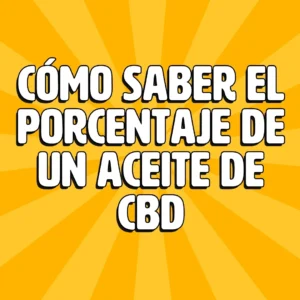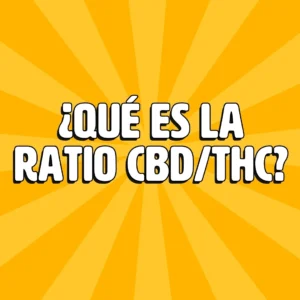What is CBD really, and why does it seem like it’s suddenly everywhere, from the shelves of health food stores to trendy cafes in major cities around the world?
Whether you’ve heard of CBD and would like to try it for yourself, or simply want to know what CBD is and how it works, you’ve come to the right place!
In this post, we will take a journey through the world of CBD, where we will explain what it is and explore its many uses and benefits. Who knows, you might find that CBD has a special place reserved in your self-care routine.
Start…
What is CBD and what is it for?
CBD, or cannabidiol, is one of more than a hundred chemical compounds known as cannabinoids, found in the cannabis sativa plant.
It is a chemical compound that is naturally found in the cannabis plant and does not contain tetrahydrocannabinol, more commonly known as THC, so it does not produce psychoactive effects, i.e. it is not a drug and does not cause the “high” associated with cannabis.
And if you’re wondering how CBD works and what it’s good for, let’s see…
When applied topically or consumed through smoke inhalation or edible consumption, CBD interacts with neuroreceptors in the endocannabinoid system, which sends signals between cells to help regulate movement, mood, internal balance (homeostasis), and immune system responses.
CBD and its medicinal properties
The use of medical CBD has gained popularity in recent years due to the many health benefits it brings, all of which are backed by various scientific research and clinical trials that show that CBD is effective in treating a wide variety of health problems, from pain and anxiety to treating seizure disorders and skin problems.
Here is a summary list of the most outstanding properties of CBD:
- Antiemetic: Reduces nausea and vomiting.
- Antiinflammatory: Fights inflammation in the body.
- Antioxidant: Neutralizes free radicals, preventing cell damage.
- Antipsychotic: It helps manage psychotic symptoms.
- Anxiolytic: It relieves anxiety and reduces the symptoms of anxiety disorders.
- Antidepressant: It improves symptoms of depression.
- Neuroprotective: It protects neurons and promotes the health of the nervous system.
- Anticonvulsant: Reduces the frequency and severity of seizures.
- Analgesic: Relieves pain.
- Antitumor and anticancer: It has properties that could help in the fight against cancer.
- Hypotensive: It can lower high blood pressure.
- Sedative: It helps induce sleep or relax the nervous system.
- Immunomodulator: It modulates the immune system, potentially benefiting autoimmune conditions.
It is important to note that, while some of these properties have been supported by scientific studies and clinical trials, others still require more research to fully understand their effectiveness and mechanisms of action.
5 Science-Proven Benefits of CBD and Their Side Effects
Both because of its origin (the cannabis plant) and the potential for benefit it provides, CBD is one of the most researched and debated compounds in the field of natural medicine in recent times.
This non-psychoactive compound has captured the attention of scientists and consumers alike, due to its broad spectrum of therapeutic effects and minimal incidence of adverse side effects.
Through rigorous studies, science has revealed the multiple benefits it can offer for overall health and well-being. Let’s look at some of them:
1. Anxiety and Depression Relief
CBD acts on the endocannabinoid system and serotonergic receptors to relieve anxiety and depression. This system is a complex network that regulates key functions such as mood, sleep, and appetite.
Studies have shown that CBD interacts with this system, modulating the release of neurotransmitters that play a crucial role in regulating anxiety and depression, being effective in reducing anxiety in stressful situations such as public speaking or other stressful situations.
For anxiety management, CBD oil administered sublingually is highly recommended due to its rapid absorption and almost immediate effect, while capsules and edibles may be preferable for those looking for longer relief throughout the day. Dosage varies by individual, but it is advised to start with a low dose and adjust as needed to achieve the desired effect.
2. Epilepsy treatment
In recent years, CBD has been used as a promising alternative for patients with forms of epilepsy, as it interacts with the body’s endocannabinoid system, which plays a key role in regulating neuronal activity.
This interaction can help stabilize the abnormal electrical activity in the brain that causes seizures. According to studies, CBD binds to and activates receptors in the endocannabinoid system, which helps curb excess neuronal activity and abnormal electrical discharges, leading to a reduction in seizures.
In fact, in 2018, the U.S. Food and Drug Administration issued a report on the U.S. Food and Drug Administration (FDA). The U.S. Food and Drug Administration (FDA) has approved the use of CBD to treat seizures stemming from Lennox-Gastaut syndrome and Dravet syndrome — two rare forms of epilepsy — in patients at least 2 years of age.
3. Improves sleep quality
CBD has been shown to have significant potential to improve sleep quality in people who experience sleep disorders such as insomnia or frequent nighttime awakenings.
This is due to its anxiolytic properties and its ability to reduce physical pain, which are common factors that can interfere with restful sleep. Additionally, CBD can be especially helpful for those who suffer from circadian rhythm disorders due to irregular work schedules, helping to adjust their sleep cycles.
For those considering CBD as an option to improve sleep, it is recommended to start with low doses and adjust according to the body’s response. The dosage can be customized to find the optimal point of well-being and satisfaction.
4. Treatment for neurological diseases
The use of CBD in the treatment of neurological diseases has gained interest thanks to its therapeutic properties, such as analgesic, anti-inflammatory, anticonvulsant, neuroprotective, anxiolytic, and antidepressant effects.
These properties make CBD useful in the management of conditions such as multiple sclerosis, Alzheimer’s, Huntington’s disease, among others.
Some studies have revealed that the use of cannabinoids can improve quality of life and reduce spasticity in patients with multiple sclerosis and decrease the frequency and severity of seizures in patients with refractory epilepsy.
5. Pain relief
Another benefit of CBD that has been shown is its efficiency in offering relief from muscle pain, neuropathic pain, general chronic pain, and specific conditions such as fibromyalgia and chemotherapy-induced pain.
CBD works by blocking pain signals to the brain, reducing inflammation, relaxing tight or spastic muscles, and speeding up recovery between workouts. It also protects against oxidative damage and supports nerve cell health, which is crucial for neuropathic pain management.
However, it is important to consult with a healthcare professional before starting to use CBD for pain, especially in conditions such as arthritis, where it is advised that CBD should not replace disease-modifying treatments.
It is crucial to approach the use of CBD and other cannabinoids in medicine with an evidence-based perspective, taking into account the potential therapeutic benefits and demystifying the stigmas and prejudices associated with their use.
As we have seen, the benefits of using cannabidiol could be diverse, from muscle relaxation, reducing seizures or reducing anxiety. For more information, you can take a look at our blog where we talk about other benefits that CBD brings.
Best CBD Products
Cannabidiol (CBD) can come in different ways, adapting to a wide range of needs and preferences. This versatility makes it accessible to different types of users, from those seeking therapeutic relief to those interested in its skincare benefits.
Below, we explore the main categories of CBD products and offer helpful tips for their use.
CBD Flowers
This is the most natural form of presentation of cannabidiol, as it is the flower that comes from the cannabis sativa plant, and is the ideal choice for those who prefer more traditional methods for the use of CBD.
CBD flowers are used in a variety of ways, smoking, through vaporization, as an infusion, or to prepare your favorite dishes.
It’s worth remembering that vaping is an effective way to enjoy the benefits of CBD without the harms associated with smoke. When cooking, it’s important to decarboxylate the flowers first to activate the CBD.
CBD Oils
CBD oils are available in different concentrations of cannabidiol which can be 10%, 15%, 25% or 40% and the choice of one or the other will depend on several factors including previous experience with CBD, tolerance level and desired effect.
The oils are versatile and easy to use, as they come with an eyedropper, being ideal for people who want to consume CBD drops and thus control the exact dose and adjust it according to the personal needs of each one.
In addition, they can be easily incorporated into food and beverages for those who prefer not to consume them directly. The flexibility of CBD oils makes them an excellent choice for both beginners and more experienced users in the world of cannabidiol.
Vapers
For those who prefer fast action, CBD vapes are a great option. Vaping CBD is a technique that involves inhaling vapor generated at a low temperature, which is infused with CBD oil.
This method allows CBD to be effectively absorbed by the body quickly, as the compound is transported directly into the bloodstream, making it easier to perceive its effects almost instantaneously.
It’s important to note that CBD affects everyone differently. Therefore, it is recommended that each user start with low concentrations of CBD and adjust them progressively, experimenting until they find the dose that best suits their specific needs.
Does CBD consumption cause side effects?
Although generally considered safe and well-tolerated, CBD consumption can lead to side effects in some people.
The most common side effects associated with CBD include fatigue, changes in appetite, diarrhea, and alterations in weight.
It is also important to consider that CBD can interact with certain medications, so it is recommended to consult a healthcare professional before starting to use it, especially if you are already under medical treatment.
In addition, the quality and dosage of CBD can influence the occurrence of side effects. Low-quality or mislabeled CBD products may contain impurities or higher than declared levels of THC (the psychoactive compound found in cannabis), which could contribute to unwanted side effects.
It’s always advisable to consult a healthcare professional before incorporating CBD into your self-care routine, especially if you’re taking other medications or have pre-existing health conditions.
When choosing CBD products, quality and transparency are critical. Opt for trusted brands that offer clear information about where CBD comes from, extraction methods, and lab test results. Starting with a low dose and gradually adjusting will allow you to find the perfect balance for your specific needs.
Differences Between CBD and THC
What they have in common is that they are both cannabinoids present in the cannabis plant, popularly known as marijuana. However, they have significant differences in their effects and applications.
As we have previously said, CBD does not cause psychoactive effects and is known for its therapeutic properties and is used to relieve a variety of medical conditions, such as rheumatologist and arthritis problems, anxiety, chronic pain, epilepsy, and sleep disorders, among others.
On the other hand, THC (tetrahydrocannabinol) does produce psychoactive effects and is responsible for the feeling of euphoria or “high” that users experience when consuming marijuana.
Although THC also has medicinal applications, such as relieving pain, stimulating appetite, and reducing nausea, its use is more limited due to its psychoactive effects.
In many jurisdictions, the recreational and medicinal use of THC is regulated or prohibited due to these effects.
CBD Reviews
From the perspective of consumers, most CBD users consider its use positive and highlight its effectiveness in reducing stress, resting better at night or relaxing after excessive physical training.
But there are also a few users who think that CBD does not work, as they have experienced little or no benefit, and in some cases have perceived changes in appetite.
Be that as it may, each user’s experience can vary significantly depending on the individual biochemistry, the quality and concentration of the CBD product used, as well as the dosage and mode of administration.
It is important that each user starts with low doses and gradually adjusts them according to their personal experience and desired effects.
Bibliography and Digital Sources
- Baron, E. (2018). Medicinal Properties of Cannabinoids, Terpenes, and Flavonoids in Cannabis, and Benefits in Migraine, Headache, and Pain: An Update on Current Evidence and Cannabis Science. Headache: The Journal of Head and Face Pain, 58(7), pp.1139-1186.
- Burstein, S. (2015). Cannabidiol (CBD) and its analogs: a review of their effects on inflammation. Bioorganic & Medicinal Chemistry, 23(7), pp.1377-1385.
- Ab Hanna (2018) What are Terpenes. https://hightimes.com/guides/what-are-terpenes/
- Unni, A. 2018. THC vs. CBD: Which Should You Use? https://hemppedia.org/es/thc-vs-cbdcual-deberias-usar/
- Effects of cannabidiol on amphetamine-induced oxidative stress generation in an animal model of mania – PubMedhttps://pubmed.ncbi.nlm.nih.gov
- National Academies Press (2017). The Health Effects of Cannabis and Cannabinoids: The Current State of Evidence and Recommendations for Research
- Corroon J, Felice JF – Altern Ther Health Med (2019). The Endocannabinoid System and its Modulation by Cannabidiol (CBD).
SOUTHERN PHARMA SPAIN S.L will not assume any liability arising from the use by third parties of the content of the website and may exercise all civil or criminal actions that correspond to it in the event of infringement of these rights by the user. It is absolutely forbidden to use the website or any of its elements for illicit purposes. The benefits and properties of cbd that could be read on the website www.gorillagrillz.com are in no way attributed to the products sold on the website. CBD products are not medicines and should not replace treatments with them. What you can read on our website are not official medical claims but references to preclinical studies. If you have any questions, you can consult with a professional health personnel. We remind you that in Spain CBD products are for topical use. All products have THC<0.2% analyses in accordance with Royal Decree 1729/1999.
| Pablo Ruiz Professional copywriter. |












